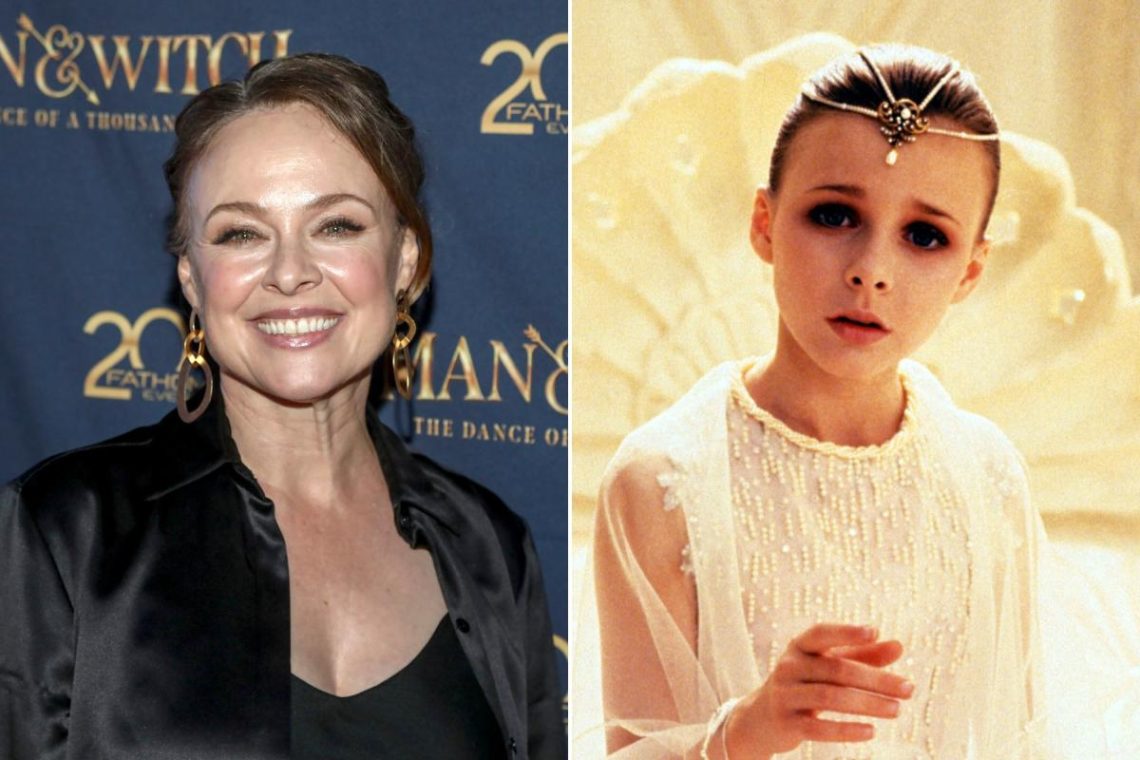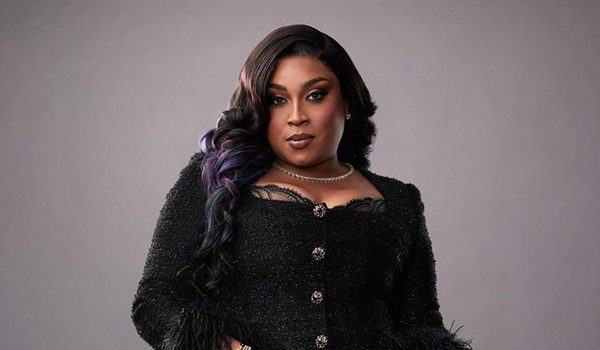When Tami Stronach was 10, she transfixed young audiences as the Childlike Empress in 1984’s The NeverEnding Story. It was her first and last major acting role in a feature film — until now.
Exactly 40 years after the cult flick, Stronach returns to the big screen in another fantasy film, Man and Witch: The Dance of a Thousand Steps. She plays the Witch in a cast including Christopher Lloyd, Sean Astin, Michael Emerson and her husband, Greg Steinbruner, who wrote the screenplay and plays the Goatherd.
“It’s completely insane to go back to film in your 50s as a woman,” Stronach told Yahoo Entertainment. “It’s like everything in our society is telling you that it’s the wrong move — but that’s the move I’m making,” she laughs.
It’s taken four years to make Man and Witch, which is in theaters on July 28 and 30 — as well as a gentle push from her husband. Stronach left Hollywood right as she broke through. She later became a modern dance performer and choreographer. She started her own dance company in 2000, and co-founded (with Steinbruner) the entertainment studio Paper Canoe Company, which creates family-oriented content for stage and screen, 10 years ago when their daughter, Maya, was born. (Maya also has a role in Man and Witch.)
“I was acting, I just wasn’t acting in film,” Stronach explained. “It was really my husband. He said, ‘Don’t you think you should do just one more film from your bucket list?’ I said, ‘Why? We have our life and all our projects.’ He said, ‘Let’s just do a 10-minute short.’ I said, ‘OK, that will be fun.’ Then the short turned into a feature film script that was delivered to me on my birthday. It was a very romantic gift — and a dare.” (Stronach also made a cameo as herself in the 2018 film Ultra Low).
Stronach incorporated her dancing background into the movie, which sees the Goatherd turn to the Witch to reverse a spell put on him preventing him from finding true love. She also serves as executive producer.
“It was a tremendous learning curve,” she said. “Outside of the wonderfulness of being able to act in film again, in a script that I loved, with my family, a wonderful director and cast, I also got to grow as a person” being a producer and getting to “guard the female characters and make sure that I felt they were progressive and reflecting our era. It’s an ’80s nostalgia film, but we need our [strong] female characters in 2024.”
Making movies today versus 1984 are experiences that are worlds apart. The daughter of two archeologists, Stronach was just a kid in musical theater in San Francisco when a casting director scouted her and she landed in Wolfgang Petersen’s The NeverEnding Story. She spent her summer in Bavaria, in southeast Germany, for the three-month shoot, living in a hotel with her young co-stars Noah Hathaway (Atreyu) and Barret Oliver (Bastian). They swam in the pool together, raced up and down in the elevators and banged on each other’s doors. It was like summer camp for Hollywood child stars.
She loved the “magical world” Petersen created for the Michael Ende book turned film, set in Fantasia with Falkor the luckdragon and a quest for Auryn medallion, but knows her experience on set wouldn’t fly today.
“I don’t think you could do what we did back then with child labor laws and everything,” Stronach said. “We were on set 10 hours a day. We were there all day. I mean — I loved it. I would wander through the different rooms and talk to the makeup artists. The stuntman and I became friends. I hung out a lot with the artistic behind-the-scenes crew and they would take me to the English beer gardens. I couldn’t drink beer because I was 10, but they taught me tricks. I can do all these coaster tricks from spending so much time in the beer gardens with the crew of The NeverEnding Story.”
Stronach was very much a kid though, even losing teeth — prominent incisors — during the movie shoot. Petersen “was not happy about that at all,” she recalls with a laugh.
She spent two weeks in a dentist’s chair to create a denture to go over her existing teeth. The prosthetic “looked really weird,” she said. “If you stop and pause, you’ll see the denture.” It also caused her to have a lisp. Fortunately, by the end of the shoot, her adult teeth broke through and the denture was ditched.
“My teeth had grown in enough that Wolfgang said, ‘Don’t smile. Have a calm, serious face. If you have to smile, just the lips, [no teeth],’” she recalled. “My husband, who’s also a director, said to me, ‘I think Wolfgang telling you not to smile to cover up those teeth was actually an interesting piece of direction. It kind of created a containment — your face isn’t moving a lot — and it gives a gravitas.’ I’m like: Yeah, so mysterious, so serious — and really just trying to hide my teeth.”
Stronach’s academic parents “were so ill-prepared” for her overnight stardom, which included releasing a pop album, Fairy Queen (recorded in one day while in Germany for the movie’s junket).
“We really just had no idea,” she said. “We were surprised at every turn — surprised at the scope of it when we arrived,” not realizing it was the most expensive film ever produced in Germany at the time, “surprised at the reach of it after it was released, surprised at the sticking power.”
It made for unwanted attention for Stronach, who returned to California to resume school. Men camped outside her home. She received marriage proposals and nude film role offers. These incidents factored into her family’s decision to halt her Hollywood career just as it began.
It was clear, “Here’s the door you could walk through — and you’ll have to navigate a lot of that — or you wait until you’re 18 and see what you feel like doing,” she said. “It seemed like a no-brainer to be honest with you. I really threw myself into dance and continued to act [in theater] so I didn’t necessarily feel that I had been cut off from my creativity. It was just like: If you want to pursue film, you would do that as an adult.”
When adulthood came, “It’s so hard to get off the dance train. There’s nothing more fun, but eventually your body just breaks down,” Stronach laughed. “It had always been in my mind that eventually I would go back to acting. I was still jumping into plays constantly throughout my dance life. When my daughter was born, my husband and I started making more theater. It just starting to call to me.”
She couldn’t avoid signs of encouragement along the way as she began to test the waters. The “NeverEnding Story” theme song popped up in a 2019 episode of Stranger Things. The show’s Millie Bobby Brown turned it into a viral dance challenge. Then a Spotify ad — with a Falkor — appeared on a billboard outside her house.
“It was just like: What is happening? It had been gone from my life for 30 years and then suddenly it was just everywhere,” she said. It all became “one more finger on my back going: Come on, Tami. Take a risk. Make the movie.” Now, here she is.





